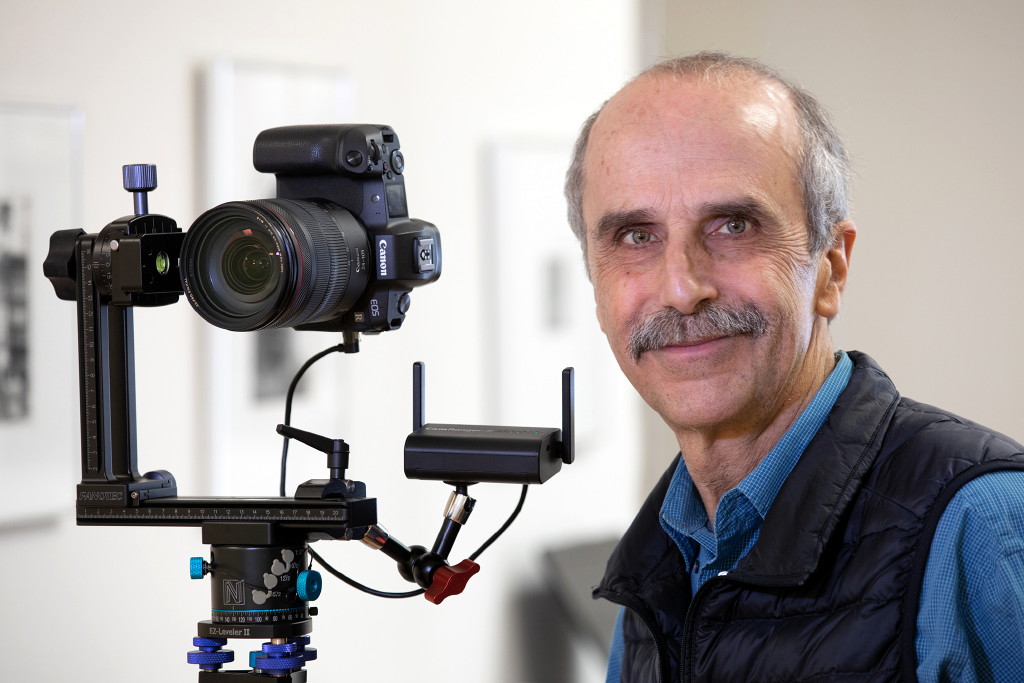By Pam Hersh
The last remaining artifact in the window of the now defunct Landau’s Woolens store on Nassau Street in Princeton is an Albert Einstein poster with the message: “Imagination is more important than knowledge.”
As a self-described techno-moron when it comes to my knowledge of how things work, I am a genius at appreciating technology-based imagination – particularly the way technology works to enhance my appreciation of the arts. The melding of arts and innovative technology became apparent last week when my friend Princeton artist Ryan Lilienthal, who also is an immigration and family attorney, sent me an email announcing his latest exhibition: “The Mueller Report, the Legal Case Against Roger Stone, and the DACA Legislative Briefs.” The virtual art show comprises several extremely imaginative sculptures, created by artist/lawyer Lilienthal, and all thematically related to contemporary Trump-era legal conundrums.
Because of the pandemic, Ryan was unable to have an in-person art exhibit. So he launched it on his website as a 360 degree interactive installation – made possible by Princeton photographer, artist, and engineer Ricardo Barros. It is viewable at www.ryanlilienthal.com/360-degree-interactive-installation
I never could tell you how they did it, but I can tell you to watch it and enjoy imagination at its most inspiring. Ryan, who now spends more time being an artist than being a lawyer, happens to be an award-winning painter, as well as a sculptor, who relies on imagination and technology, to explore concepts, particularly those that are dense in content and need more transparency.
Ryan became “fascinated by the opaque and transparent qualities of pigment as a tool for amplifying representational art,” and it led him to explore conceptual art and sculpture. “The Mueller Report is a much talked about document that most people never have seen, nor have they seen any of the documents that make up the report, such as, an arrest warrant or an indictment. What I have tried to do is to give visibility to the documents and the words in the documents. For example, with the Roger Stone case, I convey the concepts and implications of the case with stones. Each stone is encased in a collage of the words used in the different aspects of the Roger Stone case. The stones can be assembled into different shapes representing different aspects of the Roger Stone case, including a straight wall of stones representing a divided country,” Ryan said.
But the real artistic masterpiece, in Ryan’s opinion, is the imagination of Ricardo Barros and his creative use of technology to come up with a “an exhibition that reflects Ricardo’s talents as much as mine. Ricardo brought my art to life. Even though it was the pandemic that drove me to seek creative ways to exhibit my works, the end product is masterful whether or not people are confined to their homes. The 360 exhibition just may be a new powerful, educational way to experience art at all times,” Ryan said.
Ryan met Ricardo, when Ryan was taking art instruction from Ricardo’s wife Heather Barros, who is the founding director of Art Collaborations, an art school in Princeton offering year-round classes for children, teens, and adults.
Ricardo Barros is a Princeton-based professional photographer and videographer with commercial and fine art clients that have included Grounds for Sculpture and Harvard University. As an FAA licensed drone pilot, he uses a drone to take high quality photographs and video for short documentaries and films. And he just received the news that he is a 2021 Fellowship recipient from the New Jersey State Council on the Arts.
Born in Brazil, he came to America when he was seven years old, obtained undergraduate and graduate degrees in engineering and ended up in New Jersey when he worked for the New Jersey Department of Transportation from 1980-96.
“I was doing my art and photography in the evenings when I was working for the state. It was frustrating; I was unable to take time I needed to do it right,” Ricardo said.
When he left his job at the state, the freedom fueled his creativity.
Ryan’s exhibition is Ricardo’s third 360-tour presentation – his other 360 tours feature his own photography and the Morven Museum.
Ryan, while still painting portraits of friends, family and commissioned portraits, as well as his famous scenes of Princeton neighborhoods and community, is already imagining another artistic, legalistic, technological tour de force on the concept of privacy in our world of technology invasiveness.
The right to privacy is not mentioned in the Constitution, but the Supreme Court has said that several of the amendments create this right. Ryan is already scheming how to take this concept of technological invasion of privacy and translate it into a work of art – one that would be masterfully conveyed to the public by Ricardo.
Perhaps we can convince Einstein to enhance his words of wisdom: “Imagination is more important than knowledge – and is key to gaining knowledge.”
For more information, visit https://ricardobarros.com/ or www.ryanlilienthal.com/360-degree-interactive-installation

